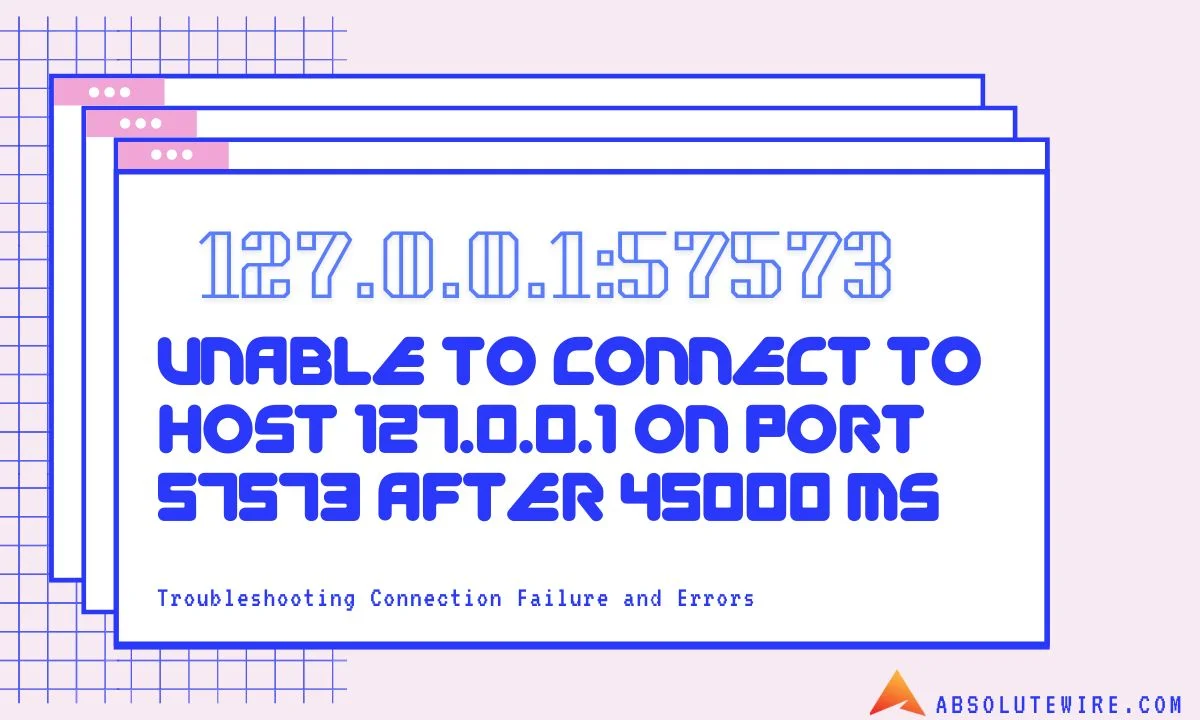127.0.0.1:57573: A Comprehensive Guide to 127.0.0.1

Introduction to Localhost
Localhost, commonly referred to by the IP address 127.0.0.1, is a standard term in networking and web development. It acts as a loopback address to route information back to the same machine for testing and development purposes. Understanding localhost is crucial for developers, network administrators, and anyone involved in IT infrastructure. This guide will delve deep into the technicalities, uses, and significance of localhost, specifically focusing on the 127.0.0.1 address.
What is 127.0.0.1:57573?
127.0.0.1 is the loopback address in the IPv4 address space, often associated with the term ‘localhost’. This IP address is used to establish an IP connection to the same machine or computer being used by the end-user. Essentially, it’s a way for a computer to communicate with itself.
Detailed Explanation
127.0.0.1 is part of the reserved block of IP addresses within the range 127.0.0.0 to 127.255.255.255. The significance of this address lies in its ability to simulate network communication without involving external network interfaces or actual network hardware.
Role in Networking
In networking, 127.0.0.1 plays a pivotal role in testing and development. It allows developers to test software and network configurations in an isolated environment, ensuring that applications work correctly before deployment in a real network setting.
IPv4 Addressing
Within the IPv4 protocol, certain address ranges are reserved for special purposes, and 127.0.0.1 falls into the loopback range. It is predefined, meaning no configuration is necessary for it to function, simplifying the development and testing processes.
The Role of Localhost in Networking
Localhost, specifically the 127.0.0.1 address, is integral to various networking functions. It is extensively used in testing environments, development setups, and network diagnostics.
Testing
Localhost provides a controlled environment for testing applications without affecting live servers. It allows developers to test new features, debug issues, and ensure stability before releasing updates.
Development Environments
Using 127.0.0.1, developers can create local servers that mimic live server environments. This setup is essential for web development, where testing both front-end and back-end interactions is critical.
Loopback Functionality
The loopback mechanism ensures that data sent to 127.0.0.1 is routed back to the same machine. This functionality is crucial for debugging and testing network configurations, ensuring that software behaves as expected.
How Does 127.0.0.1 Work?
The operation of 127.0.0.1 involves several technical mechanisms that ensure data packets are routed correctly within the same machine.
Technical Mechanisms
When data is sent to 127.0.0.1, the operating system’s network stack intercepts these packets and routes them back to the same machine. This process does not involve any physical network interface, making it a purely virtual interaction.
OS Interaction
Different operating systems handle the 127.0.0.1 address similarly, ensuring compatibility and reliability across platforms. The OS kernel plays a crucial role in managing this loopback address, ensuring seamless data routing.
Routing Process
The routing process for 127.0.0.1 is straightforward. Data packets destined for this address are immediately looped back to the sender without leaving the machine. This simplicity ensures quick and efficient data handling.
Benefits of Using Localhost
Localhost offers numerous advantages, especially in development and testing scenarios.
Security
Since data sent to 127.0.0.1:57573 does not leave the local machine, it remains secure from external threats. This isolation provides a safe environment for testing potentially vulnerable applications.
Speed
Interactions involving 127.0.0.1 are incredibly fast since they bypass physical network interfaces. This speed is advantageous for development and testing, where quick feedback loops are essential.
Cost-Effectiveness
Using localhost eliminates the need for additional hardware or external servers, reducing costs. Developers can set up robust testing environments on their local machines without investing in costly infrastructure.
Setting Up a Localhost Environment
Creating a localhost environment involves several steps and tools to simulate a live server environment effectively.
Required Tools
- Web Server Software (e.g., Apache, Nginx)
- Database Management System (e.g., MySQL, PostgreSQL)
- Integrated Development Environment (IDE)
Step-by-Step Guide
- Install Web Server Software: Choose and install web server software like Apache or Nginx.
- Configure Web Server: Set up virtual hosts and configure server settings.
- Install Database System: Install a database management system to handle data storage.
- Link Web Server and Database: Ensure the web server can communicate with the database.
- Deploy Application: Install and configure the application to run on the localhost.
Common Mistakes to Avoid
- Misconfiguring server settings
- Failing to start required services
- Not securing the localhost environment
Common Applications of 127.0.0.1:57573
127.0.0.1 is widely used across various applications in web development and network testing.
Web Servers
Localhost is often used to run web servers locally for development purposes. Popular software like Apache and Nginx allows developers to create local instances of websites for testing and debugging.
Databases
Localhost environments frequently include databases, enabling developers to test database interactions locally. Systems like MySQL and PostgreSQL can be configured to run on 127.0.0.1.
Application Testing
Developers use localhost to test applications in an isolated environment. This setup helps identify and fix bugs without affecting live users.
Localhost and Web Development
Localhost is a critical component in web development, providing a sandbox environment for building and testing web applications.
Server-Side Development
Developers can test server-side code locally, ensuring that it interacts correctly with databases and other services before deployment.
Front-End Development
Localhost allows front-end developers to test their code in a controlled environment. They can check for issues like rendering problems and performance bottlenecks.
Testing APIs
Localhost environments are ideal for testing APIs, ensuring that they function correctly and handle requests as expected before going live.
Security Aspects of Localhost
While localhost is inherently secure due to its isolated nature, there are still security considerations to keep in mind.
Localhost Security
Ensuring that the localhost environment is configured correctly is crucial. Misconfigurations can lead to vulnerabilities that could be exploited.
Vulnerability Mitigation
Regular updates and patches for web server software and databases help mitigate vulnerabilities. Developers should follow best practices to secure their localhost environments.
Best Practices
- Use strong passwords for databases and applications
- Regularly update software to the latest versions
- Monitor localhost logs for suspicious activity
Troubleshooting Localhost Issues
Issues with localhost setups can arise, requiring troubleshooting to resolve them effectively.
Common Problems
- Web server not starting
- Database connection issues
- Misconfigured server settings
Diagnostic Tools
Tools like network sniffers and log analyzers help diagnose and resolve issues with localhost environments.
Fixes
- Verify server configurations
- Ensure all required services are running
- Check for software updates and patches
127.0.0.1:57573 in Different Operating Systems
The behavior of 127.0.0.1 can vary slightly across different operating systems, each with its own configuration nuances.
Windows
In Windows, 127.0.0.1 is managed by the OS’s network stack. Configuration files like hosts can be used to manage localhost mappings.
macOS
macOS also uses the hosts file to manage localhost. Additionally, tools like Homebrew simplify the installation of web server software and databases.
Linux
Linux systems offer extensive customization options for localhost setups. Configuration files like /etc/hosts and network tools provide robust control over localhost environments.
Advanced Uses of Localhost
Localhost is not limited to simple testing and development; advanced use cases leverage its capabilities for more complex scenarios.
Virtual Hosts
Setting up virtual hosts allows multiple local sites to run on a single localhost environment, simulating multiple domains.
Network Simulations
Localhost can be used to simulate complex network environments for testing purposes, including virtual LANs and VPNs.
Docker Integration
Docker containers often use localhost for inter-container communication, providing isolated environments for application development and testing.
Localhost vs. Remote Hosting
Understanding the differences between localhost and remote hosting helps determine the appropriate use cases for each.
Pros and Cons
- Localhost: Quick setup, cost-effective, ideal for development
- Remote Hosting: Accessible from anywhere, better for production environments
Use Cases
- Localhost: Development, testing, debugging
- Remote Hosting: Production, client access, scalability
Performance Comparisons
Localhost offers superior performance for development due to the lack of network latency. Remote hosting provides better performance for live applications accessed by multiple users.
Practical Examples of Using 127.0.0.1:57573
Real-world examples illustrate the versatility and importance of 127.0.0.1 in development and testing.
Sample Projects
Developers can set up local instances of popular web applications like WordPress or Drupal on 127.0.0.1 for development and testing.
Code Snippets
Sample code snippets can demonstrate how to configure web servers and databases to run on localhost, providing hands-on learning opportunities.
Real-World Scenarios
Case studies of successful projects developed using localhost environments highlight best practices and common pitfalls.
Historical Context of Localhost
The concept of localhost has evolved over the years, influenced by the development of networking technologies and standards.
Origin
The idea of a loopback address originated in the early days of IP networking, providing a means for internal communication within a single machine.
Evolution
As networking technologies advanced, the role of localhost expanded, becoming a fundamental part of development and testing workflows.
Notable Milestones
Key milestones include the standardization of the 127.0.0.1 address and the development of modern web server software that leverages localhost for development.
Future Trends in Localhost Utilization
Emerging technologies and trends will continue to shape the use of localhost in development and testing.
Emerging Technologies
Technologies like containerization and microservices are driving new ways to use localhost for development.
Predictions
Future trends suggest increased reliance on localhost environments for rapid development and testing, supported by automation and CI/CD practices.
Impact on Development Practices
The evolution of localhost usage will enhance development workflows, making them more efficient and reliable.
FAQs about 127.0.0.1:57573
What is the purpose of 127.0.0.1? 127.0.0.1 is used as a loopback address for testing and development purposes, allowing a computer to communicate with itself.
Can 127.0.0.1:57573 be accessed from the internet? No, 127.0.0.1 is a local address and cannot be accessed from outside the machine.
How do I set up a web server on localhost? Install web server software like Apache or Nginx, configure it to run on 127.0.0.1:57573, and start the server.
What are the security risks of using localhost? While localhost is generally secure, misconfigurations can introduce vulnerabilities. It’s important to follow best practices to secure your local environment.
Can I run multiple websites on localhost? Yes, by setting up virtual hosts, you can run multiple websites on different ports or subdomains of localhost.
Why is localhost important in web development? Localhost provides a safe and efficient environment for developing, testing, and debugging web applications before deploying them to live servers.
Conclusion 127.0.0.1:57573
Understanding localhost and the 127.0.0.1 address is essential for anyone involved in web development and network administration. This guide has explored the technical aspects, benefits, and practical applications of localhost, providing a comprehensive overview of its significance. As technology evolves, localhost will continue to be a fundamental tool in the development and testing toolkit.





